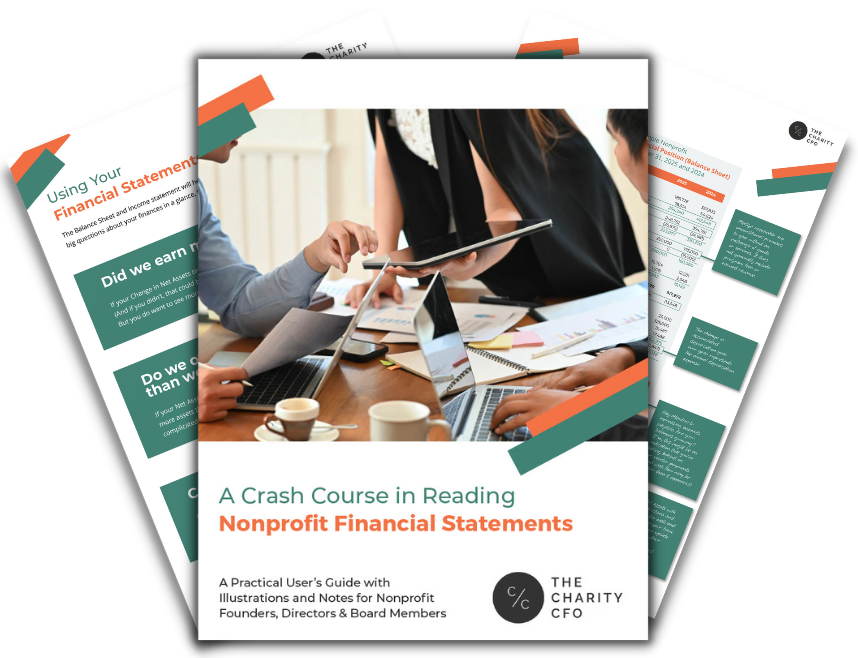Do a Google search on nonprofit bookkeeping, and you’ll find page after page of articles on nonprofit accounting. And that’s a problem.
Because while nonprofit bookkeeping and accounting are related, they’re not the same thing.
Sure, you’ll find overlap between the two roles In many small organizations. And it’s sometimes not clear where the line should be drawn. But the experience, responsibilities, and deliverables required of bookkeepers are very different from those required of accountants.
It breaks down like this:
A bookkeeper records and organizes financial data; an accountant interprets and presents that data.
Furthermore, nonprofit bookkeeping differs in some critical ways from for-profit bookkeeping too. Because nonprofit bookkeepers must manage restrictions, grants, and expenses in significantly more detailed ways than a for-profit bookkeeper.
The nonprofit bookkeeper is the front line in the battle for the accurate financial data you need to run your business, so let’s review the core responsibilities of a nonprofit bookkeeper.
What is nonprofit bookkeeping?
Nonprofit bookkeeping is the process of entering, classifying, and organizing financial data for the purpose of creating accurate financial records for your organization.
Nonprofits must maintain thorough and accurate financial records to comply with both Generally Accepted Accounting Principles (GAAP) and maintain their tax-exempt status with the IRS. And it’s impossible to do that without accurate bookkeeping.
Recording all of your expenses, revenue, and financial transactions in a timely and accurate manner is the key to achieving accountability and transparency–the primary goals of nonprofit accounting. Here are some of the primary tasks required of a nonprofit bookkeeper:
- Track income and expenses
- Record and classify payments and bank transfers
- Organize and maintain receipts
- Create invoices for goods, services, and donations
- Enter bills and vendor invoices
- Prepare bank reconciliations
- Manage payroll
- Execute data entry to keep the general ledger current
- Allocate revenue and expenses to restricted fund accounts
- Prepare the data accountants used to create income statement, balance sheet, and cash flow statement
Let’s take a deeper look at the four key bookkeeping tasks: payroll, invoicing, expense allocation, and recording business transactions.
What are the basic nonprofit bookkeeping tasks?
Bookkeepers lay the foundation for the accounting processes that will follow. They organize the data and ensure accuracy so the accountant can create reliable and timely financial reports.
Payroll
Managing payroll is a complicated and time-consuming task. And it’s one of the essential roles of bookkeeping in a nonprofit organization.
The stakes are high– if you make a mistake with payroll, somebody might not get paid. And you’re sure to have some anxious coworkers. Yet there’s more to payroll than making sure everyone gets the right check…
Bookkeeping for payroll includes:
- Administering federal and state payroll taxes
- Deducting money for benefits
- Allocating payroll expenses according to their impact on restricted funds and functional expenses.
On top of that, nonprofit bookkeeping requires staying updated on income tax changes and filing requirements to ensure compliance.
So it’s much more complex than it may seem at first glance. That’s why we recommend most nonprofits work with a payroll processing service rather than trying to do it themselves.
A payroll processor makes bookkeeping for a nonprofit easier. They can apply the necessary deductions for each employee, cut checks (and make direct deposit) for each payroll period, and file state and local taxes to help keep you compliant with the most up-to-date tax requirements.
Invoicing
Many nonprofits have earned revenue streams, like membership subscriptions, tuition fees, course enrollments, or sales at company stores. In those cases, nonprofit bookkeeping includes creating accurate invoices (that account for and collect any required sales tax) to track every sale.
Even if your nonprofit isn’t selling anything, you’ll still need to process invoices.
You should create invoices for incoming donations as well. Both to track money coming into your organization and share with your donors as proof of their gift.
Invoices should include a header with your logo and contact information, client contact information, invoice number and date, itemized breakdown of services, and terms and conditions.
Recording & Allocating Expenses
Any money that flows out of your organization must be recorded. And ensuring that every receipt, bill, check, credit card charge, and bank transfer gets into your system is a core function of nonprofit bookkeeping.
Each expense must be recorded in your accounting software and allocated to the correct expense account, like office supplies, rent expense, payroll, etc. This way, you can track precisely how the money was spent.
But expense allocation is even more complex in nonprofit bookkeeping, thanks to the need for functional expense reporting.
You can read more about allocating functional expenses here, but the quick version is that you must allocate all expenses based on how they fit into these 3 categories:
- General & administrative expenses
- Program expenses
- Fundraising expenses
A crucial responsibility of nonprofit bookkeeping is tracking exactly how money was spent so that your nonprofit can create a functional expense report at the end of each year.
Recording business transactions
Of course, the central role of nonprofit bookkeeping is to keep the books of your organization current and accurate.
Bookkeeping for some small nonprofits may be as simple as creating invoices for donations received and paying salaries and day-to-day expenses.
Most organizations will also need to track payments they are owed (accounts receivable), bills that they haven’t paid (accounts payable).
And beyond invoices and bills, the nonprofit bookkeeper must record bank deposits, manage donor acknowledgment letters, make adjusting bank entries, review the accuracy of their data, and reconcile bank and credit card statements.
PRO TIP: The secret to better bookkeeping is sticking to a set schedule for processing and recording transactions that establishes tasks to do on a daily, weekly, monthly, quarterly, and annual basis.
What does a nonprofit bookkeeper not do?
It’s important to note that bookkeepers are not certified public accountants (CPAs). Bookkeeping does require training and experience but not a specialized degree.
There is often some overlap in smaller organizations. But here is a list of tasks that some nonprofits push onto their bookkeepers that are instead the role of an accountant.
Bookkeepers do not…
- Analyze transactions and business performance
- Prepare financial statements and reports
- Determine budgets and wages
- Compile and file tax returns
Getting started with nonprofit bookkeeping isn’t easy, but it is essential.
The impact of accurate bookkeeping trickles down to every aspect of your nonprofit. Efficiency, transparency, and compliance are the hallmarks of an organization with effective bookkeeping.
Nonprofit bookkeeping solved, once and for all
We’ve done our best to give you a crash course into nonprofit bookkeeping. But if you’re already falling behind in your books, you can’t rely on a google search or blog article to get you back on track.
Instead, seek out an experienced nonprofit bookkeeping service you can trust.
At The Charity CFO, we handle the books and all of your accounting needs. It’s like having an in-house team dedicated to your organization, without the overhead cost of a full accounting department.
With our nonprofit bookkeeping and accounting services, we’ll ensure your books are always audit-ready. Plus, give you timely financial reports and expert advice that help you carry out your mission.
We’re honored that over 120 nonprofits trust us with their bookkeeping and accounting. And we’d be excited to show you how we can help your organization meet your goals.
Schedule a Free Consultation
Do You Struggle to Make Sense of Your Financial Statements?
Get our FREE GUIDE to nonprofit financial reports, featuring illustrations, annotations, and insights to help you better understand your organization's finances.
Get the free guide!




0 Comments